Show Poodles
Show Poodles are known for their intelligent, elegant, and versatile nature, with a rich history dating back centuries. From their origin as water retrievers to their prominence in various dog competitions, Poodles have captured the hearts and admiration of millions. In this detailed exploration, we will delve into the fascinating history of the breed, their distinctive characteristics, and the factors that have shaped them into the beloved dogs we know today.
Poodle History and Varieties
The Poodle is one of the most recognizable and popular dog breeds, known for their intelligence, elegance, and distinct coat. Thought to have originated from Germany in the 15th century, the breed was initially bred for water retrieval, with their name derived from the German word “pudel,” meaning “to splash in water.” Despite their German origins, the Poodle’s rise in popularity was primarily in France, where the breed became the national dog and took on a sophisticated and elegant reputation.
There are three main size varieties of Poodles: Toy, Miniature, and Standard. The Standard was the first to develop, used mainly for duck hunting. This variety also demonstrated a highly effective affinity for water, leading to the unique “Poodle Clip,” seen in many show Poodles today. The cut was designed to allow freedom of movement in water while keeping the joints and vital organs warm. Miniature and Toy Poodles were bred later, mainly for companionship, but still possessed strong retrieving instincts.
The long-standing history of Poodles in competition dates back to the late 19th century. The breed first appeared in American Kennel Club (AKC) dog shows in the 1880s. Show Poodles are judged on their elegant athletic appearance, harmonious build, and unique coat. A well-balanced Poodle demonstrating grace, agility, and sound temperament are sought after traits in the show ring. Additionally, coat color and the intricacies of their clip can play a role in competition. For a Poodle to fare well in shows, a combination of excellent grooming, training, and genetics is crucial.
Each variety of Poodle has its respective competitions in dog shows. The categories in which they are assessed include obedience, agility, and conformation. In conformation events, Poodles are judged primarily based on factors such as appearance, movement, and temperament, which adhere to the breed standards set by the AKC. Obedience competitions showcase the Poodle’s intelligence, demonstrating their willingness and ability to follow commands. Finally, agility events allow Poodles to display their incredible athletic abilities, navigating various obstacle courses successfully and swiftly.
Many Poodle breeders and enthusiasts emphasize the need for responsible breeding, especially when it comes to show Poodles. To ensure the breed’s future success and preservation, breeders collaborate with organizations like the Poodle Club of America (PCA). The PCA provides resources and guidelines for breeders, including recognizing outstanding Poodles that embody breed ideals. In addition, they award the coveted ‘Versatility in Poodles’ (VIP) title, which promotes the elegance, intelligence, and athleticism of show Poodles.
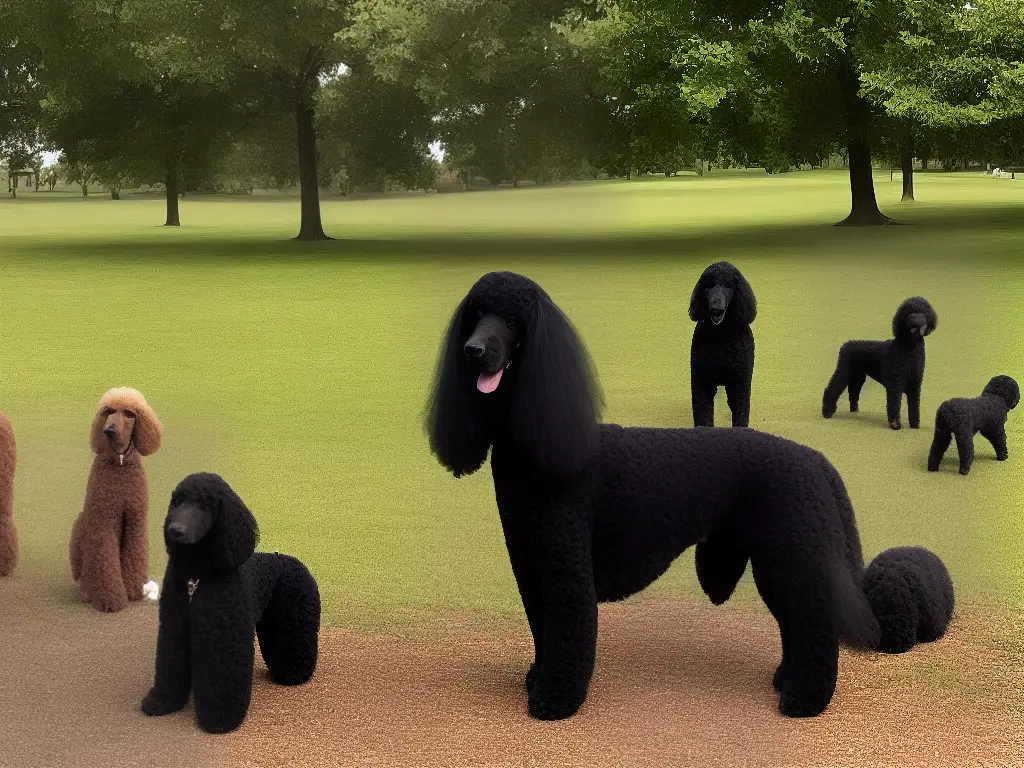
Breed Characteristics and Temperament
There are three different varieties of show Poodles, which include the Standard, Miniature, and Toy Poodles. The key difference between them is their size, with the Standard being the largest at over 15 inches tall at the shoulder, the Miniature measuring between 10 and 15 inches, and the Toy standing under 10 inches. Despite the size differences, all three varieties share similar physical traits, such as their dense, curly coats, which come in multiple colors like black, white, apricot, and gray. Poodles are also renowned for their unique and fancy haircuts; these were initially designed for protection during water hunts but have since become a defining feature of show Poodles, adding to their elegance and charm.
In terms of temperament, Poodles are known for their intelligence, energy, and friendly nature. They are considered one of the most intelligent dog breeds, excelling at problem-solving and adaptability. This intelligence, combined with their eagerness to please, makes them very trainable and successful in various dog sports, such as obedience, agility, and dock diving. Due to their easy-going and affectionate nature, Poodles make great companions for families and individuals alike, as long as they are given the attention and stimulation they require.
Poodles are generally good with children and other animals, making them suitable family pets. However, like all dog breeds, supervision is important, especially with smaller children or more delicate Toy Poodles. Additionally, due to their high intelligence and need for mental stimulation, Poodles can develop problematic behaviors if not given proper training and enrichment. As a result, it’s essential to ensure that a Poodle gets enough exercise, mentally stimulating activities, and socialization to maintain their happy and well-rounded temperament.
One consideration when owning a show Poodle is their grooming requirements. Poodles have a hypoallergenic, curly coat that does not shed like other breeds, but it does require regular grooming to prevent matting and keep up their spectacular appearance. Owners of show Poodles must be ready to invest in professional grooming every few weeks or learn to groom their dogs themselves, following breed standards for haircuts and presentation. Regular brushing and coat care at home will also be necessary to maintain the Poodle’s coat in top condition.
Socialization is vital to make sure your Poodle grows up to be a well-rounded and confident adult, especially for show Poodles who must navigate the busy environment of dog shows and interact with judges. Early exposure to various people, animals, and situations helps build a resilient and adaptable dog that excels not only in the show ring but also as a loving and devoted companion. It is essential to remember that Poodles, as intelligent and adaptable as they may be, are individuals. Their behaviors and temperaments can vary across and within the size varieties, so it’s crucial to devote time and effort to understand and cater to your Poodle’s specific needs and traits.
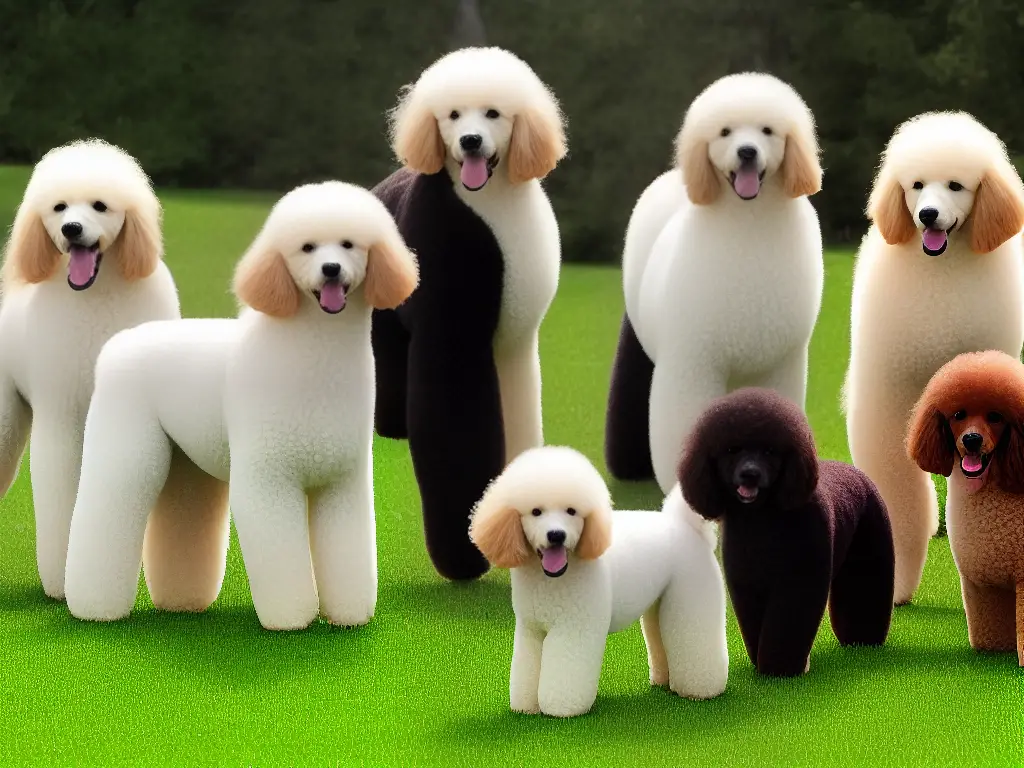
Poodle Grooming
Understanding your Poodle’s traits and needs is particularly important when it comes to grooming show poodles. Different techniques, tools, and styles are used to maintain their appearance, with many show poodles groomed in either the Continental or English Saddle clip. These clips are officially recognized styles by the American Kennel Club (AKC) for poodles participating in conformation events. They showcase the poodle’s elegant features, graceful movement, and athletic ability while also adhering to the breed’s historical function as a water retriever. Committing to proper grooming and socialization will ensure your Poodle’s success in the competitive world of dog shows and as a beloved pet.
The Continental clip is the more extreme of the two styles and often seen on show poodles in the United States. This style involves shaving the poodle’s face, throat, front and hind legs, and base of the tail, while leaving carefully sculpted hair on the body, ankles (known as bracelets), pompons on the tip of the tail, and decorative rosettes over the hips. The remaining hair on the body is typically sculpted into rounded shapes, emphasizing the poodle’s muscular structure and accentuating its movement.
On the other hand, the English Saddle clip features a slightly more conservative look compared to the Continental clip and is more commonly seen on show poodles in Europe. In this clip, the poodle’s face, throat, and base of the tail are shaved, while patches of short hair called “jackets” are left on the body. The poodle’s front legs are shaved from the paws to the elbow, while its hind legs are shaved from the hock to the hip, leaving bracelets above the paws and pompons on the hip joints. A pompon is also left on the tip of the tail.
In addition to mastering these specific clips, show poodle groomers must also be skilled in using a variety of grooming tools to maintain the poodle’s hair. The slicker brush, pin brush, comb, and grooming scissors are essential tools for detangling, shaping, and maintaining the poodle’s coat. Groomers often use electric clippers to shave certain areas of the poodle’s hair accurately, such as the face, throat, and legs. Maintaining a poodle’s coat can be a time-consuming process, as the hair must be regularly brushed, washed, and trimmed to prevent matting and to keep the dog looking its best.
Show poodle grooming not only focuses on the dog’s appearance but also aims to highlight its athletic and graceful nature. Even minor details, such as trimming the hair between the toes and around the eyes, can have a significant impact on the overall presentation of the dog. Ultimately, the art of grooming show poodles involves both excellent technical skills and an appreciation for the breed’s elegance and versatility.
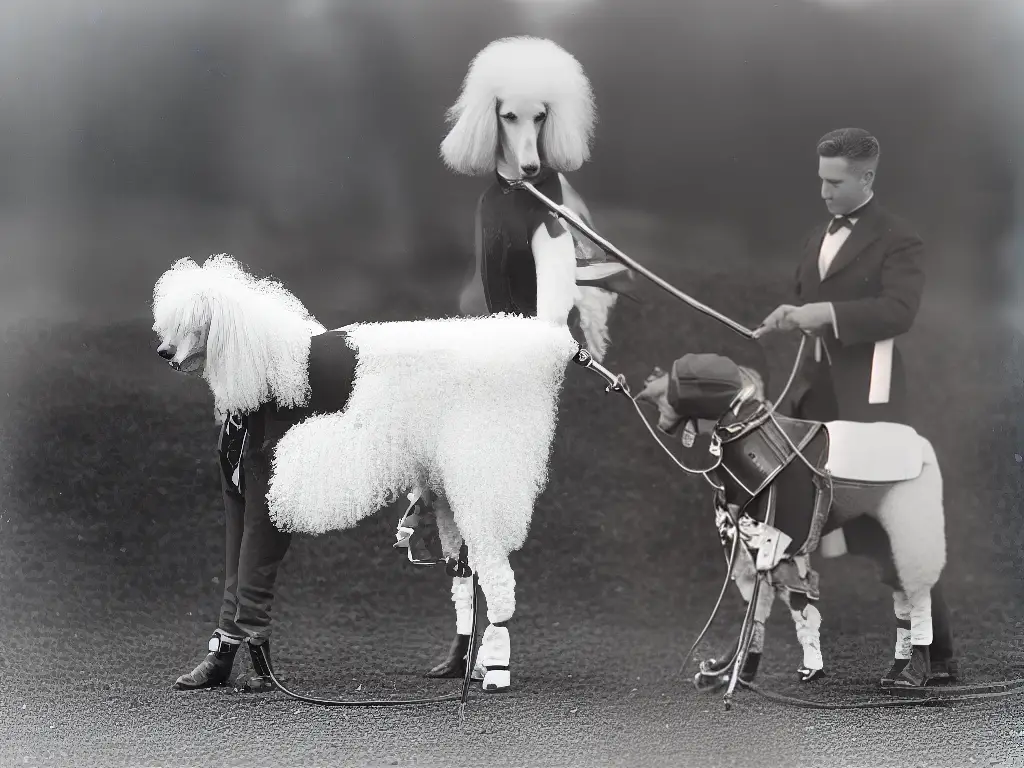
Poodle Health and Genetics
Beyond their impressive grooming, show poodles, like any other breed of dog, can be susceptible to a variety of health issues and genetic disorders. It is essential for potential owners and breeders to be aware of the common health concerns associated with poodles in order to provide the best care and maintenance for these beautiful and intelligent animals, ensuring their well-being and ability to thrive in show environments.
One prevalent health condition that affects all three varieties of poodles (standard, miniature, and toy) is hip dysplasia. This genetic disorder involves abnormal development and subsequent degeneration of the hip joint, leading to pain, inflammation, and difficulty in movement. Responsible breeders should have their poodles’ hips evaluated and certified by the Orthopedic Foundation for Animals (OFA) to ensure that the dogs used for breeding purposes have a low risk of passing down this condition to their offspring.
Another health concern specific to show poodles is Progressive Retinal Atrophy (PRA). This genetic disorder causes gradual degeneration of the retina, leading to vision impairment and eventual blindness. PRA is an inherited condition, making it crucial for breeders to test their breeding dogs’ DNA for the presence of the gene mutations responsible for PRA. Canine eye exams by veterinary ophthalmologists, conducted annually, are important in tracking the progression of the eye disease and catching any early signs of vision problems in poodles.
Show poodles are also prone to certain heart diseases, such as subvalvular aortic stenosis, which is a narrowing of the aortic valve, and dilated cardiomyopathy, an enlargement of the heart muscle that impairs its ability to pump blood effectively. To maintain their dogs’ optimal cardiovascular health, poodle breeders should have regular heart screenings and evaluations performed by certified cardiologists. This ensures that any potential heart diseases are diagnosed and treated promptly, which is crucial in maintaining the overall health and well-being of the show poodle.
Allergies are another common health issue seen in poodles, many of which are genetically predisposed. These can range from food allergies to environmental irritants, such as pollen, grass, or dust mites. Poodles with allergies may exhibit symptoms like constant itching, red or irritated skin, and ear infections. It is essential that breeders and owners work closely with their veterinarians to identify and manage allergies through dietary adjustments, medications, or other treatments.
Show poodles may be susceptible to certain endocrine disorders, such as hypothyroidism and Addison’s disease. Hypothyroidism is a deficiency of the thyroid hormone that can lead to hair loss, weight gain, and lethargy, while Addison’s disease is an insufficiency of adrenal hormones, causing weakness, gastrointestinal upset, and an inability to cope with stress. Regular veterinary check-ups and blood tests can help detect these disorders early on and allow for appropriate management of the conditions through medication and lifestyle adjustments.
By being proactive about the health and genetics of their poodles, breeders and owners can ensure the ongoing success and well-being of these elegant show dogs. Participating in dog shows and competitions is one way to accomplish this goal.

Dog Shows and Competitions
These events allow dogs to showcase their skills, talents, and physical attributes, while also providing an opportunity for socialization and bonding between dog and handler. By taking part in these activities, Poodle owners can ensure the health and happiness of their canine companions and contribute to the legacy of this beloved breed.
There are various types of dog competitions that Poodles can partake in, including conformation, obedience, and agility events. Each type of competition has its own unique requirements, rules, and judging criteria.
Conformation
Conformation shows, also known as breed shows or dog shows, are events in which Poodles are judged based on their appearance, structure, and adherence to the breed standard. These shows are organized by kennel clubs, such as the American Kennel Club (AKC) and United Kennel Club (UKC). Participants often strive for championship titles and recognition that can lead to increased prestige and breeding opportunities. In conformation, Poodles are divided into three categories: Standard, Miniature, and Toy. Judges assess each dog for breed-specific features such as body proportions, coat texture, color, and overall balance.
Obedience
Obedience competitions are another popular avenue for show Poodles. These events showcase a dog’s ability to follow commands and demonstrate good manners. Poodles are known for their intelligence and trainability, making them successful contenders in obedience trials. During these competitions, dogs and their handlers perform a series of exercises that demonstrate the dog’s ability to understand and follow instructions. These exercises include heeling, sitting, standing, retrieving an object, and responding to verbal or hand signals. Scores are based on the dog’s accuracy, responsiveness, and overall performance.
Agility
Agility competitions are particularly thrilling for spectators, as they involve Poodles navigating a timed obstacle course with the guidance of their handlers. This high-energy event highlights the athletic prowess, speed, and agility of the Poodle breed. Poodles of all sizes can excel in agility, as courses are adjusted for each dog’s height. Obstacles in these events include jumps, tunnels, weave poles, and seesaws. The dog and handler team must complete the course within a set time limit while accruing the least amount of faults, such as knocked bars or refusal to complete an obstacle.
Participating in dog shows and competitions allows Poodle owners to challenge their pets mentally and physically, create lasting memories, and showcase their beloved dog’s aptitudes and attributes. In addition to conformation, obedience, and agility, there are several dog sports in which Poodles can excel, such as rally, tracking, and dock diving. The key to success in these events is proper training and socialization for your Poodle, starting at an early age. This helps ensure a positive experience and a strong bond between dog and handler, as well as finding the right event for your Poodle to thrive in.
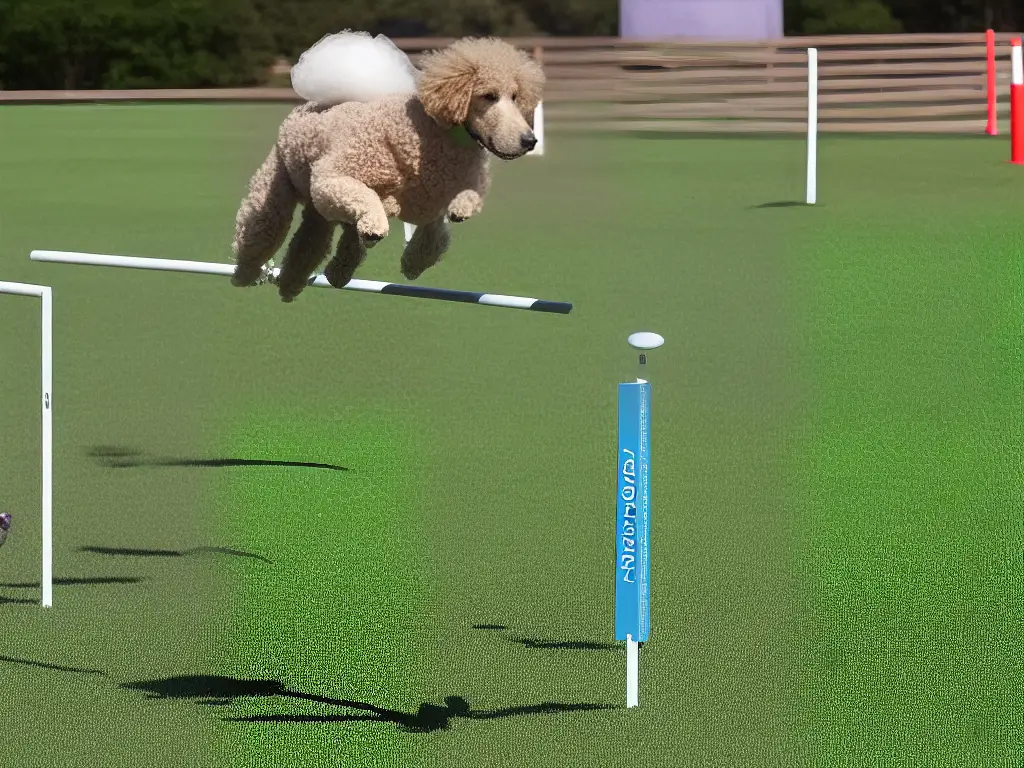
Poodle Training and Behavior
Poodles are highly intelligent and trainable dogs, making them an excellent breed for dog shows and competitions. To excel in obedience and display their remarkable skills, proper training and socialization are crucial for a show poodle. One effective training technique specific to poodles is positive reinforcement. This approach involves rewarding your poodle with treats, praise, or playtime when they perform a desired behavior. By reinforcing good behavior, your poodle is more likely to repeat it and learn more quickly. Through consistent and positive training, your Poodle can truly shine in their chosen dog sport, while strengthening the bond between you and your beloved pet.
Socialization is an essential aspect of poodle training, as it helps your poodle become comfortable around people, other animals, and new environments. Enrolling your poodle in a socialization class or a puppy obedience class can help them learn proper behavior around others. It’s crucial to expose them to various situations from a young age and create positive associations with new experiences. This can be done by allowing your poodle to meet new people and dogs, explore different environments, and engage in various activities. A well-socialized poodle will be more confident and less stressed in dog shows and competitions.
Skills training is another area that needs special attention for show poodles. As versatile dogs, poodles can participate in different kinds of dog sports, such as agility, obedience trials, and tracking events. Regardless of the chosen sport, it is important to begin with basic obedience commands, including sit, stay, down, and heel. For a show-specific skill such as stacking (the specific standing position poodles must hold while being judged), using a clicker or a treat as a marker for the desired position can help guide your poodle.
Show poodles should also receive proper training for good leash manners. For many competitions, your poodle will be required to walk or trot alongside you without pulling or straining on the leash. Practicing loose-leash walking, changing direction frequently, and utilizing treats and praise as rewards can help to improve your poodle’s leash manners over time. Don’t forget the importance of grooming, which is a significant aspect of show poodles. Acclimating your poodle to being groomed from an early age and maintaining a consistent grooming schedule will help them to feel comfortable and confident during the grooming process at dog shows.
Training a show poodle is a practice that demands patience, consistency, and dedication, as these dogs participate in high-stress environments with specific requirements. Their intelligence and eagerness to learn, however, make them exceptional candidates for competitions and events. It is important to use positive reinforcement and expose your poodle to diverse situations and experiences at an early age. By investing time and effort into proper training and socialization, your poodle will undoubtedly shine in the show ring.
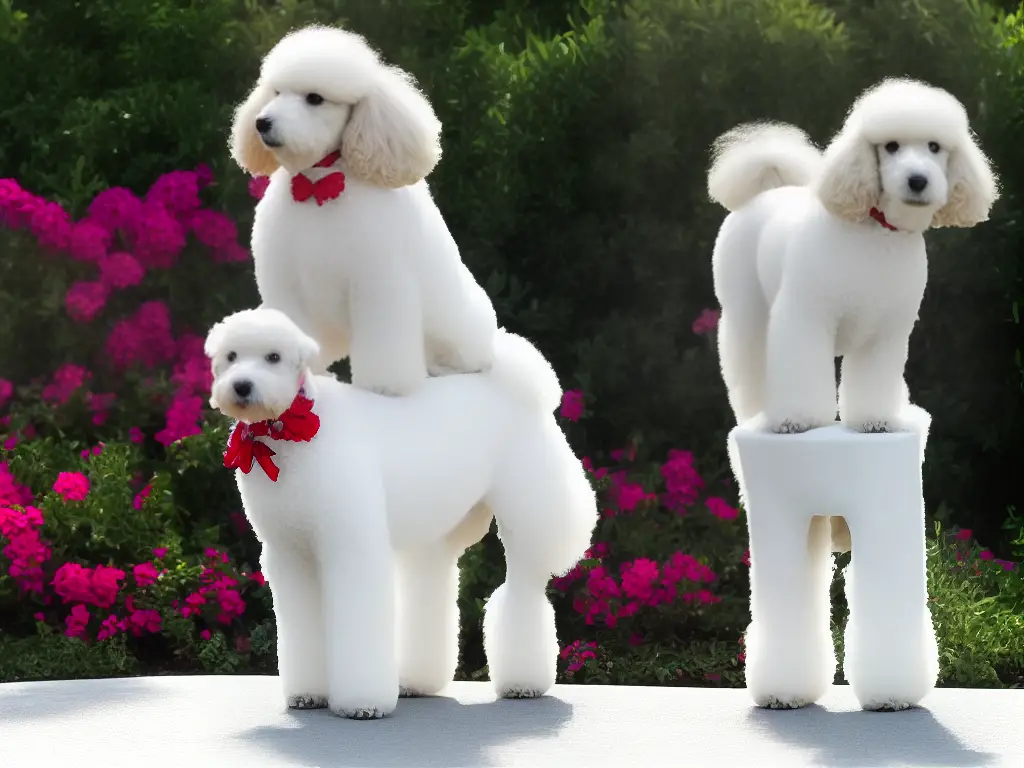
Poodle Breeding and Ethics
Preserving the breed standard is a crucial aspect of responsible breeding in show poodles. This standard consists of guidelines detailing the ideal appearance, temperament, and characteristics of each size variant (standard, miniature, and toy) within the poodle breed. It is the breeder’s responsibility to produce dogs that closely adhere to these guidelines while prioritizing the overall health and welfare of the breed. By ensuring that their poodles meet the criteria outlined in the breed standards, breeders can continue to showcase poodles’ original purpose as both working and companion animals in the show ring and beyond.
In addition to adhering to breed standards, ethical breeders also prioritize health testing and genetic screening in their breeding practices. Poodles are prone to certain hereditary health issues, such as hip dysplasia, progressive retinal atrophy, and von Willebrand’s disease. By conducting health tests and screening for these genetic disorders, breeders can make informed decisions about which dogs to breed together and reduce the risk of passing on these conditions to the next generation. This ultimately improves the overall health of the breed and reduces the instances of these diseases in show poodles.
Another essential aspect of ethical poodle breeding is ensuring proper care, socialization, and training of the puppies. From birth, breeders should give the dogs a clean environment, a nutritious diet, and proper veterinary care. Socialization and training are crucial for all dogs, but even more so for show poodles, as they need to possess excellent temperament and manners to perform well in the show ring. Early socialization to various people, animals, and environments helps to develop a well-rounded and confident dog that is capable of succeeding in the competitive world of dog shows.
Ethical breeding practices also involve the thoughtful placement of puppies in suitable homes. Breeders should not only be selective with their breeding stock but also in choosing loving and committed owners for their puppies. A responsible breeder will build strong relationships with potential puppy owners, gather information about their experience with dogs, and assess their ability to provide a loving and safe home for the poodle. This ensures that each poodle has the best chance at a happy, fulfilling life and reduces the possibility of these dogs ending up in rescues or shelters.
Responsible breeders are committed to supporting their puppy owners in the long-term. They provide information about proper care, training, and grooming, as well as being available to answer questions and offer guidance even after the puppy has left their care. Offering a lifetime support system ensures that their poodles continue to flourish in their new homes and reflects a strong commitment to the breed’s well-being. By adhering to breed standards, emphasizing health testing, providing proper care and training, placing puppies in suitable homes, and offering ongoing support to new owners, breeders not only help to maintain and improve the quality of show poodles but also contribute to the overall health, welfare, and longevity of the breed.
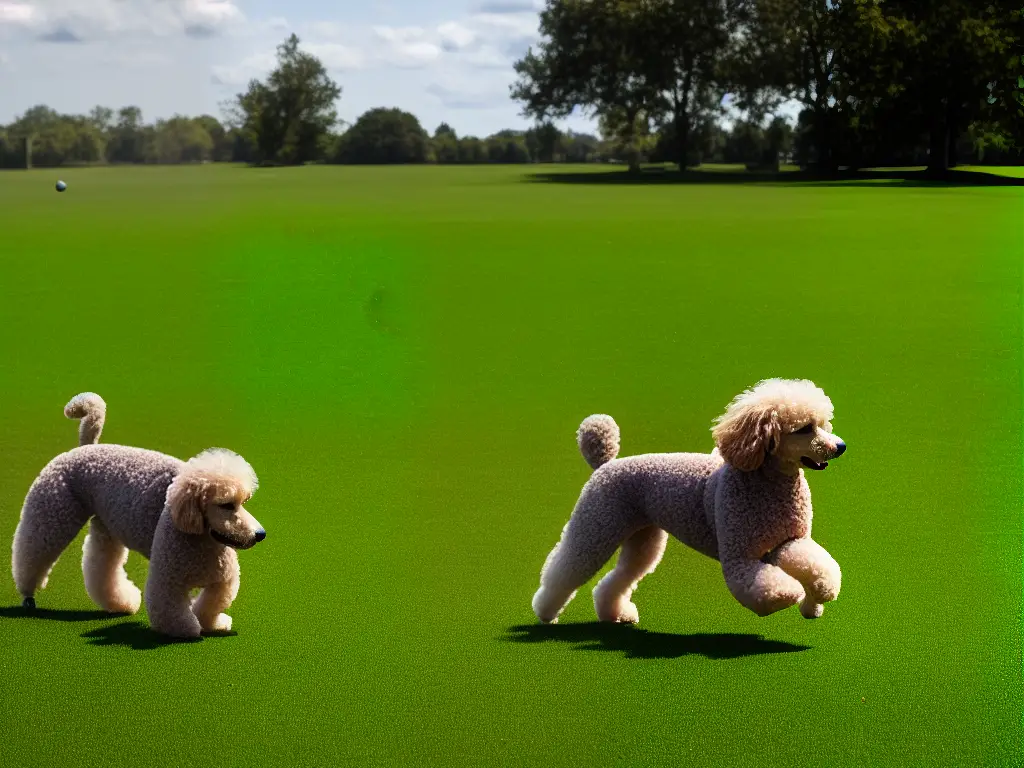
Notable Poodles and Achievements
Rooted in a rich history, poodles have been widely-known for their great success in show competitions, which has furthered the development and reputation of this breed worldwide. These achievements reflect the dedication and commitment of responsible breeders who prioritize the well-being of poodles throughout their lives, ensuring that they continue to thrive both in shows and as beloved pets in their homes.
One notable Poodle, named Ch. Whisperwind On A Carousel, was a major success in the show ring during the 1960s and 1970s. This white Standard Poodle, affectionately known as Peter, won the Best in Show at the Westminster Kennel Club Dog Show in 1969.
Another famous name in the world of show Poodles is Ch. Rimskittle Ravel, or simply Ravel, a black Miniature Poodle who has contributed significantly to Poodle breeding. After winning the prestigious Best in Show award at Crufts, the most important dog show in England, in 1982, Ravel became a sought-after sire in many countries.
One notable Poodle, a black Standard Poodle named Ch. Ale Kai Mikimoto On Fifth, or just Miki for short, was a stellar performer in the show ring during the 2000s. Miki won the Best in Show at the Westminster Kennel Club Dog Show in 2002, making her the first Standard Poodle to win this title in more than 20 years.
Another famous Poodle in history is a Toy Poodle named Ch. Smash JP Win A Victory, affectionately known as Walker. A top-winning Poodle in Japan, Walker claimed victories in many international competitions, including the World Dog Show in 2007.
An exceptional Poodle named Ch. Surrey Spice Girl, or better known as Surrey, played a crucial role in the Guide Dogs for the Blind breeding program. This Standard Poodle helped raise awareness about the capabilities of Poodles as service dogs, breaking stereotypes and making a lasting impact on the breed’s reputation. Notably, Poodles have proven to be very successful in the show ring as well, further showcasing the breed’s versatility and appeal.
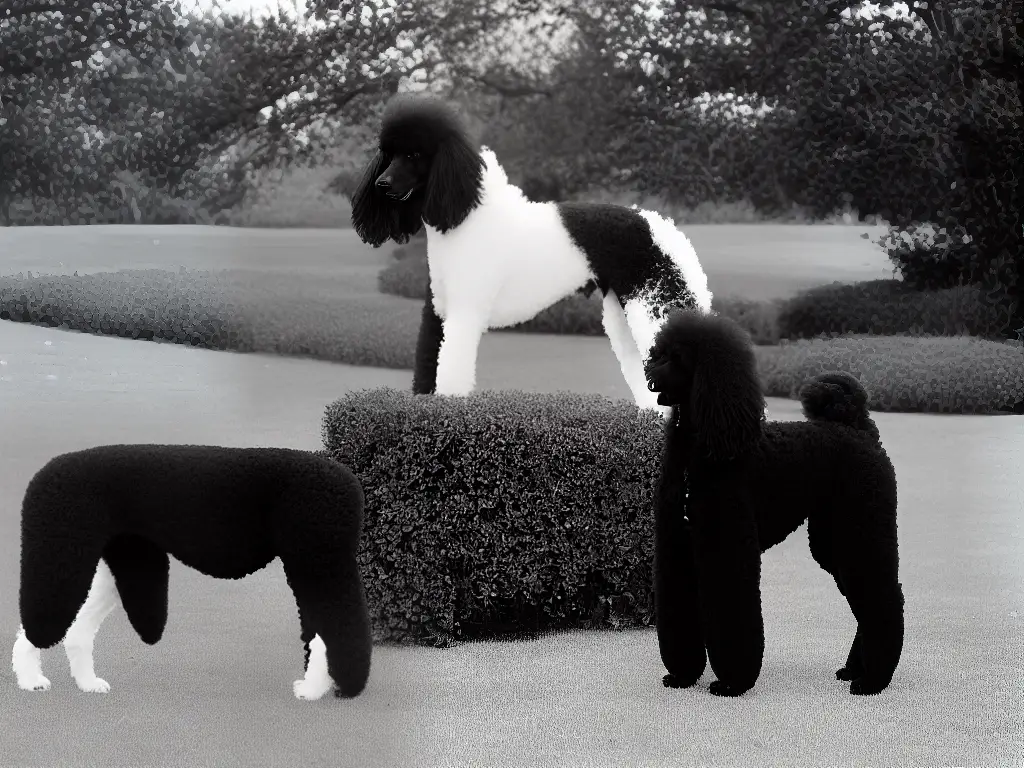
Poodle Clubs and Organizations
The Poodle Club of America (PCA) is a prominent organization that helps in preserving the high standards of this multi-faceted breed, with a specific focus on show poodles. Founded in 1931, PCA aims to protect and maintain the high standards of the breed. Serving as a leading resource for Poodle enthusiasts, breeders, and owners, the club offers valuable information on grooming, training, health issues, and more. In order to celebrate and promote the breed, PCA hosts various national events, including the Poodle Club of America National Specialty Show, which showcases prized Poodles from all over the United States.
Another important organization for show poodle enthusiasts is the United Kennel Club (UKC), which strives to provide a family-oriented, educational environment for all dog breeds, including show poodles. Founded in 1898, the UKC is the largest all-breed performance dog registry in the world. The UKC offers various events and programs to help dog owners and breeders enhance their skills, such as conformation shows, obedience trials, and other performance events. The UKC Poodle breed standard serves as a guide for breeders and judges to evaluate show poodles, ensuring that dogs adhere to the characteristics required to maintain the integrity of the breed.
The Versatility in Poodles (VIP) organization is dedicated to promoting responsible dog ownership and the wellbeing of the Poodle breed. While not solely focused on show poodles, VIP encourages owners and breeders to engage their poodles in various activities that showcase the breed’s intelligence, athleticism, and beauty. Through their programs, VIP offers various titles and awards to honor the achievements of Poodles in diverse activities such as obedience, agility, and conformation. Additionally, the organization provides educational resources and clinics to improve the overall understanding and appreciation of Poodles.
The American Poodle Club is another organization that aims to support those involved in the breeding, showing, and promoting of Poodles. Through its commitment to encourage responsible breeding and ownership, the American Poodle Club facilitates educational programs and mentors novice breeders and owners. The club also supports poodle rescue groups and health research projects related to the breed. By hosting events and collaborating with breeders, owners, and handlers, the American Poodle Club is highly proactive in fostering a supportive community for show poodles and their caretakers.
In conclusion, many clubs and organizations such as the Poodle Club of America, the United Kennel Club, Versatility in Poodles organization, and American Poodle Club play a pivotal role in supporting show poodles. These organizations offer numerous resources, event opportunities, and educational programs to ensure that show poodles and their owners receive appropriate guidance and recognition. By joining or participating in such organizations, individuals can enhance their knowledge and contribute to the community while taking their skills as breeders, handlers, and advocates for the Poodle breed to new heights.
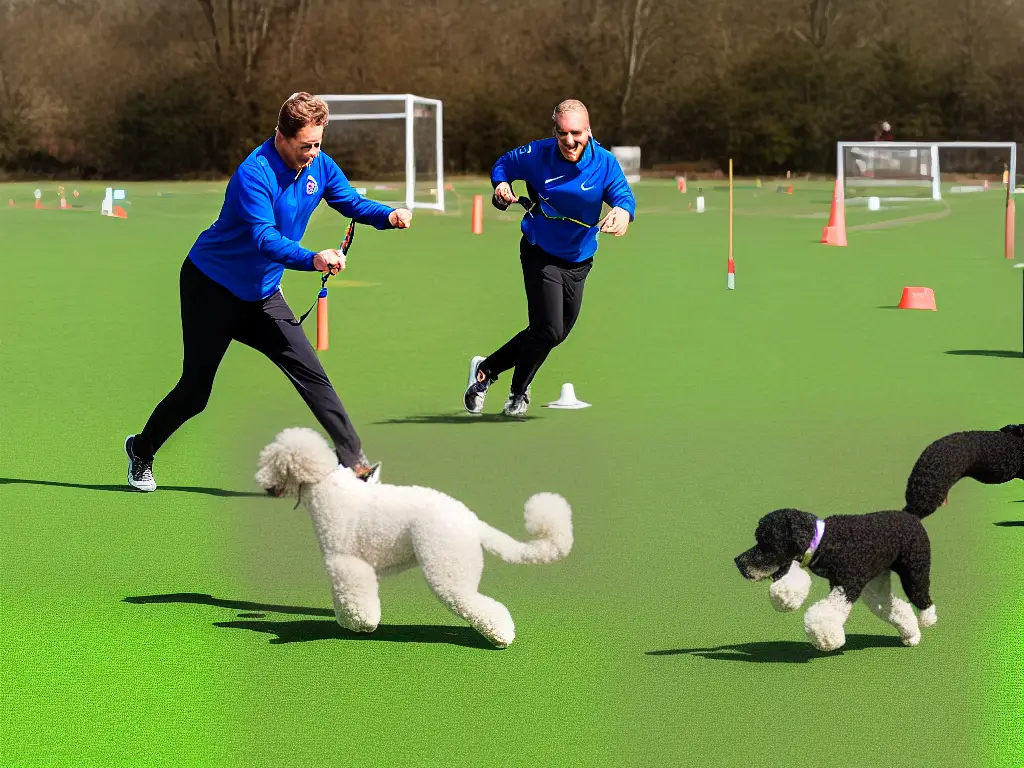
Through understanding the intricate world of show Poodles, one can truly appreciate the dedication, skill, and passion that goes into raising, training, and presenting these magnificent canines. With a wealth of knowledge at our fingertips, it is our responsibility as enthusiasts, potential owners, and breeders to preserve the integrity and well-being of the Poodle breed, ensuring their future remains as bright as their storied past. May this newfound appreciation for Poodles inspire readers to explore these remarkable dogs even further, becoming active participants in their rich world.
